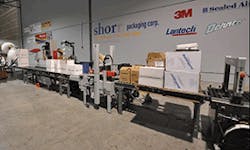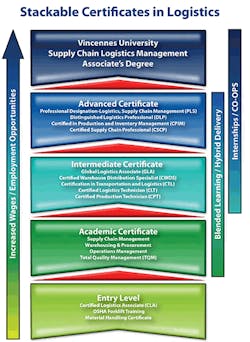The need for employees with skills in warehouse and distribution operations is a common concern aired by employers in the supply chain field. Employment vacancies for both entry-level and management positions are expected to grow over the next 10 years. So how do employers find the up-and-coming supply chain talent necessary to fulfill current and future requirements?
First of all, the skills required by employers fall into two basic categories:
• hard skills, which are skills in a particular technology, operational procedure or equipment;
• soft skills, which are generally identified as basic employee traits such as teamwork, initiative, communication and attendance.
The emphasis on soft skills has increased over the last decade as employers have identified this as a weakness in many of their prospective employees. Both of these skill groups can be addressed through training programs, although the latter are normally developed by one's environment.
The institutional education process can apply a base knowledge of procedures, technology and equipment found in today's modern warehouse. Additionally, many institutions offer courses in teamwork and basic business theory. Employees learn the right way to operate machinery and technology and understand expectations employers have for them in terms of teamwork skills.
Formally trained employees are more quickly integrated into the production process from the training process.
This translates to greater efficiencies when performing tasks such as picking and packing. Formal training also provides necessary industry knowledge, specifically an employee's role in the supply chain and the importance of customer service.
Safety and protection of inventory and the physical plant are high priorities in the warehouse environment.
OSHA regulations and safe operation of forklifts are key components of the curriculum in a formal warehouse training program. Employees need to come to employers with a mindset of "safety first" and need to be proficient in basic equipment operations. Safe operation not only minimizes injury to personnel but also reduces the damage to inventory and the physical plant that can be caused by careless or inexperienced operators using material handling equipment. This is a quantifiable cost savings to the company.
Partnering with Academia
So how is this proficiency achieved? Employers can partner with educational institutions, driving the development of curriculums necessary for industry requirements. One institution that is meeting local industry requirements is Vincennes University's Logistics Training and Education Center (LTEC) (www.VULogistics.com), located near Indianapolis, Ind. James Dolan, director of logistics at Vincennes, is the architect of the institution's comprehensive warehouse and distribution skills development program.
"Requests from industry drove the curriculum development and identified what skills certifications they needed," Dolan says. Employers also identified training necessary to address soft skills shortfalls, e.g., team leading and communications. The result is a program that meets the skill sets required by local industry.
Employers need to partner with educational institutions not only on curriculum development but also creation of the laboratory environment necessary for hands-on skills validation. A student in training may grasp the theory of reach truck operation but validation of the skill occurs by actually operating a reach truck in a warehouse environment. The Vincennes LTEC operates a 40,000 sq. ft. training warehouse complete with rack systems, material handling equipment, packaging stations and even a warehouse management system (WMS).
Through partnership with companies such as Toyota Material Handling U.S.A., Associated Solutions, New Age Industrial and Big Ass Fans, Vincennes has a laboratory operating many of the various types of equipment employees will see in industry.
An additional facet of the Vincennes LTEC program is actual production woven into the curriculum. The university has partnered with First Book (a nonprofit providing books to disadvantaged children) to distribute books to customers in the region. Vincennes students practice receiving, storage and distribution of real inventory. They process orders from various customers, properly pack them for shipment and load the packages into carrier vehicles. To date, over 3 million books have moved through the LTEC training warehouse.
Educational institutions can also provide another benefit to employers through offering on-site training at the employer's operational facility. Dolan notes almost 70% of the Vincennes LTEC training is conducted at the employer's site with the goal of improving employee work performance. Employers select a desired skill set certification from the Vincennes curriculum, which the university's trainers then bring to the employer's operational site. This has the advantage of minimal loss of employee work production and training in the environment where the skills will be utilized.
Developing Talent
How is new supply chain management talent developed? Employees in warehouse and distribution positions can be a source for entry-level supply chain managers. They are experienced in the intricacies of floor operations. Many will seek advancement to more responsibility and increased wages.
In conclusion, warehouse and distribution firms are constantly seeking new methods to reduce costs through more efficient operations; employees are a firm's most valuable asset and the key to greater efficiencies. Skilled employees are more productive employees and this translates to lower costs while improving service to customers.
Warehousing and distribution firms should seek to be proactive in the training effort and both support and enable development of these training programs by their local educational institutions. The dividends will be worth the investment.
Alan Will is president of PWG Distribution Solutions LLC (www.pwgds.com), specializing in analysis of logistics requirements for small and medium-sized firms. A retired Marine Colonel, logistics specialist, he is also a member of MH&L's Editorial Advisory Board.
About the Author
Alan Will
Retired Marine Colonel, Logistics Specialist, and President
Alan Will is a career Marine Corps officer who served 27 years and retired at the rank of colonel in 2008. Specialized in logistics operations, he implemented the first warehouse management system (WMS) in Marine Corps distribution centers and installed state of the art material handling systems. As logistics officer for the 22,500 man Marine Expeditionary Force in Al Anbar, Iraq during 2005, he oversaw transportation, maintenance, feeding and support for the force as well as for newly trained Iraqi security forces. Most recently, Will developed a warehouse and distribution skills training program for a local community college in Southeastern Virginia. The program focused on entry level skills with the potential for advanced studies in warehouse operations. He is currently president of PWG Distribution Solutions, LLC, a firm specializing in analysis of WMS requirements for small and medium-sized firms involved in distribution operations.


